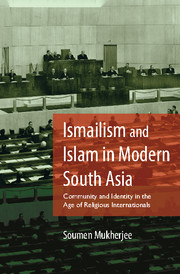 Ismailism and Islam in Modern South Asia
Ismailism and Islam in Modern South Asia Book contents
- Frontmatter
- Contents
- Acknowledgements
- List of Abbreviations
- Glossary
- Note on Transliteration
- Introduction
- 1 The Khoja Ismailis and Legal Polemics Religion and Customs in Nineteenth Century Bombay
- 2 The Howardian Moment Morality, Aryanism and Scholarship
- 3 Pan-Islamism and an Asiatic Spirit Postnational Subjectivities in an Age of ‘Transition’
- 4 The Hazir Imam, Ismailism and Islam in Late Colonial South Asia
- 5 The Importance of Being Ismaili Religious Normativity and the Ismaili International in the Age of Global Assemblages
- Concluding Reflections
- Select Bibliography
- Index
Introduction
Published online by Cambridge University Press: 23 July 2017
- Frontmatter
- Contents
- Acknowledgements
- List of Abbreviations
- Glossary
- Note on Transliteration
- Introduction
- 1 The Khoja Ismailis and Legal Polemics Religion and Customs in Nineteenth Century Bombay
- 2 The Howardian Moment Morality, Aryanism and Scholarship
- 3 Pan-Islamism and an Asiatic Spirit Postnational Subjectivities in an Age of ‘Transition’
- 4 The Hazir Imam, Ismailism and Islam in Late Colonial South Asia
- 5 The Importance of Being Ismaili Religious Normativity and the Ismaili International in the Age of Global Assemblages
- Concluding Reflections
- Select Bibliography
- Index
Summary
Ismailism has survived because it has always been fluid. Rigidity is contrary to our whole way of life and outlook. There have really been no cut-and-dried rules, even the set of rules known as Holy Laws are directions as to method and procedure and not detailed orders about results to be obtained. In some countries—India and Africa for example—the Ismailis have a council system, under which their local councillors are charged with all internal administrative responsibility, and report to me as to [sic] their doings. In Syria, Central Asia, and Iran, leadership… is vested in either hereditary or recommended leaders and chiefs, who are the Imam's representatives and who look after the administration of the various Jamats or congregations.
From all parts of the Ismaili world with which regular contact is politically possible a constant flow of communications and reports comes to me. Attending to these, answering them, giving my solutions of [sic] specific problems presented to me, discharging my duties as hereditary Imam of this far-scattered religious community and association—such is my working life, and so it has been since I was a boy.
Sultan Muhammad Shah Aga Khan III, 1954This book explores the history of development of a Shia Ismaili identity in colonial South Asia. What follows in the pages below, in this introductory chapter, is an outline of the key arguments that I develop in the course of five subsequent chapters and the analytical tools and conceptual categories I employ to explore the history of Ismailism that the above longish quote from the memoirs of the community's forty-eighth Imam encapsulates. However, I would like to outline my choice of diction at the very outset. My occasional use of the expression ‘sect’ with reference to the Shia Muslims should not be seen in the light of any core-periphery or the Church-deviance paradigm. Also, this expression is invoked quite regularly, if also somewhat loosely in its usages, by Aga Khan III himself, and certainly eschewed of its pejorative slant. On a related note, I use ‘denomination’ to refer to the Ismailis as a short-hand and by divesting the term of its Christian traits. Before we proceed any further, a word or two about working definitions of the Ismailis and Ismailism in line with contemporary understanding, and the way we in the present book understand them, will be in order.
- Type
- Chapter
- Information
- Ismailism and Islam in Modern South AsiaCommunity and Identity in the Age of Religious Internationals, pp. 1 - 29Publisher: Cambridge University PressPrint publication year: 2016


